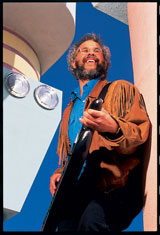|
|
Liberation Theology |
October 1998 |
|
If it feels wrong, don't do it!
In this issue's "Riffs" column (JAM, p. 120), coauthors Brian Knave and John Hvasta provide a useful list of musical styles with which freelance drummers-and other freelance musicians should be conversant. After all, you never know what kind of gig you'll be called for, and the more styles you can play, the more gigs you can pick up. This is a sound business idea that can also broaden our musical horizons.
However, this approach is not right for everyone. The danger is that, when you try to play music you only superficially understand, your performances could become the musical equivalent of processed cheese: popular with those of undiscerning tastes, but neither flavorful nor nutritious. Few people can play in multiple genres of music with genuine passion and authority. And to my mind, if you can't bring your best effort to a creative work, you probably shouldn't take the gig. In such cases, it might be wise to reject the "jack of all trades" approach.
When I was in my late teens, I felt that I should try to listen to and understand as many genres as possible, which indeed helped make me a better musician. My music has long been influenced by diverse styles, and being willing to experiment with pretty much anything made sense. Sometimes I even felt guilty about disliking some types of music, as if I had failed somehow.
As a professional musician, I occasionally had to play music that I disliked in order to make a few bucks. I imagine most of us have been there and done that. Sure, I could play every note accurately and with proper technique, and I could even put on a good show while doing it. But good music isn't about technique; technique, like technology, is a tool that can help you achieve the true goal of making music that evokes powerful emotions or communicates meaningful ideas. I felt I was failing in these instances, even if most people in the audience never knew it, because I wasn't able to emotionally commit to the performance.
I eventually came to the liberating conclusion that, if I couldn't "connect" emotionally with a piece of music and pull it off properly, I would not perform it in public. I often experiment privately with new music I don't understand, of course, but I will not perform or record for release anything I don't believe I can deliver with passion and authority.
I knew this decision would reduce my opportunities. Fortunately, I was genuinely fluent in enough genres and styles that I still had plenty of choices. But had this not been the case, I believe I would have made the same decision. Sometimes it pays to make an unsound financial decision if it is liberating for the soul. Thereafter, I felt like I was doing the right thing every time I recorded or took the stage.
So stretch your musical world all you want to. I'm not saying you should limit yourself in any way. But don't let anyone tell you that you'll never work in this town if you can't play reggae and raga, bebop and synth pop, rockabilly and Waylon 'n' Willie. Play all the music that feels right-as long as you play it with full emotional commitment and at the highest level of which you are capable. |
